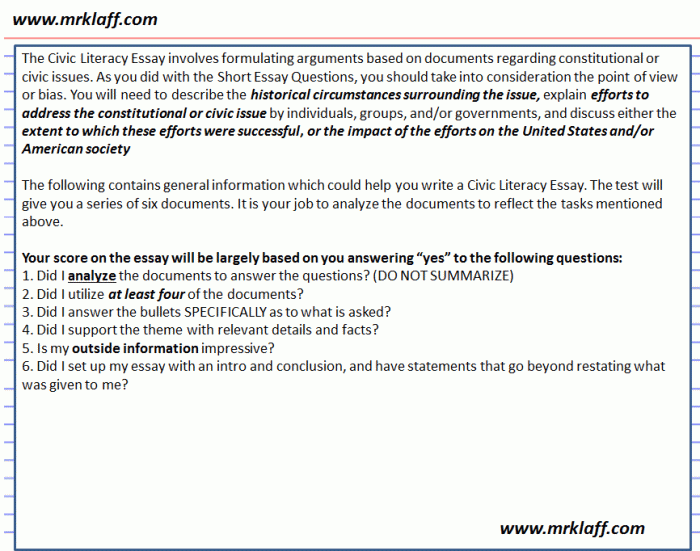How to write a civic literacy essay – Embark on a journey into the realm of civic literacy essays, where the power of informed citizenship takes center stage. This comprehensive guide will illuminate the intricacies of crafting an essay that delves into the multifaceted aspects of civic knowledge, skills, and dispositions.
Prepare to navigate the essential steps, from selecting a compelling topic to developing a robust thesis statement. Discover the art of gathering credible sources and organizing your thoughts into a coherent Artikel. Unleash the secrets of crafting an engaging introduction that captivates readers and sets the stage for your argument.
Understanding Civic Literacy
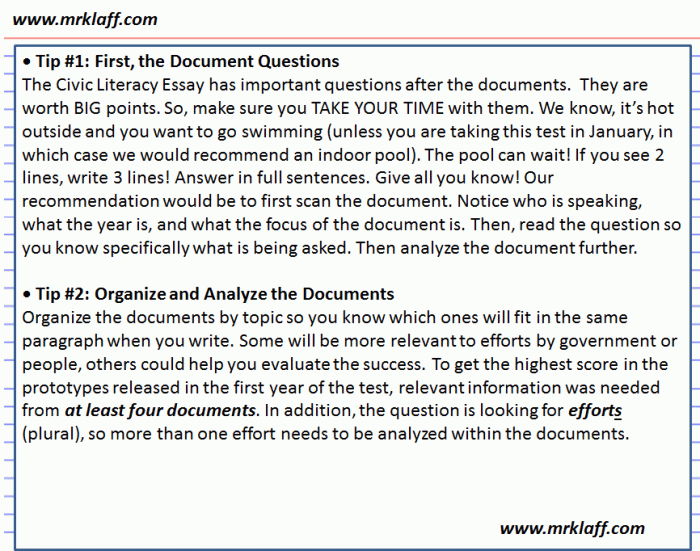
Civic literacy refers to the knowledge, skills, and dispositions individuals possess to participate effectively in civic life. It is crucial for informed decision-making, active citizenship, and the preservation of democratic values.
Civic literacy encompasses various aspects, including:
Knowledge
- Understanding of government structures, policies, and processes
- Knowledge of historical events and their impact on society
- Awareness of current social and political issues
Skills
- Critical thinking and problem-solving abilities
- Communication and interpersonal skills
- Collaboration and consensus-building skills
Dispositions
- Respect for diverse perspectives and opinions
- Commitment to civic engagement and participation
- Sense of responsibility and accountability
Preparing to Write an Essay
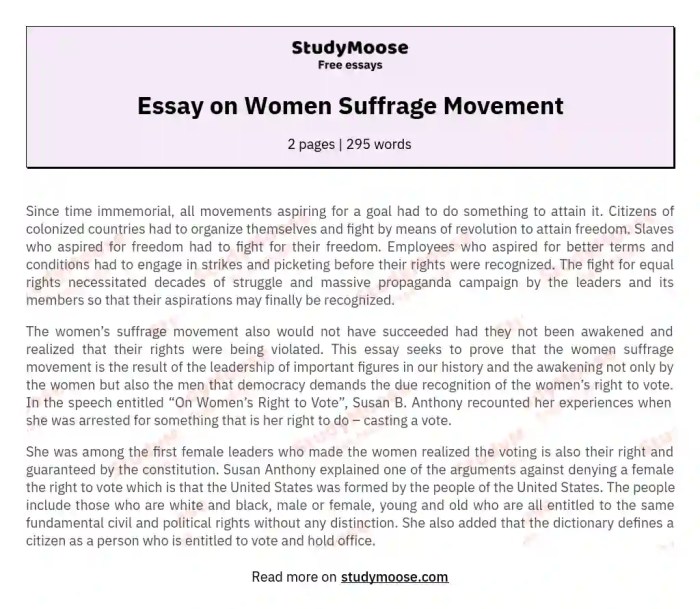
Writing a civic literacy essay requires careful preparation to ensure a well-crafted and persuasive argument. This preparation involves choosing a topic, developing a thesis statement, conducting research, and organizing the essay.
Choosing a Topic
Selecting a topic that aligns with the assignment’s requirements and your interests is crucial. Consider the following factors when choosing a topic:
- Relevance to the assignment prompt
- Personal interest and knowledge
- Availability of credible sources
- Time constraints
Developing a Thesis Statement
The thesis statement is the central argument of your essay. It should be clear, concise, and arguable. A strong thesis statement:
- States your main point
- Is specific and focused
- Is supported by evidence
- Is not a fact or a question
Research and Gathering Credible Sources
Thorough research is essential for supporting your thesis. Use credible sources such as academic journals, books, government documents, and reputable websites. Avoid using biased or unreliable sources.
Organizing and Outlining the Essay
Organizing your essay into a logical structure helps readers follow your argument. Consider using an Artikel to plan the flow of your essay, including an introduction, body paragraphs, and conclusion.
Crafting the Introduction
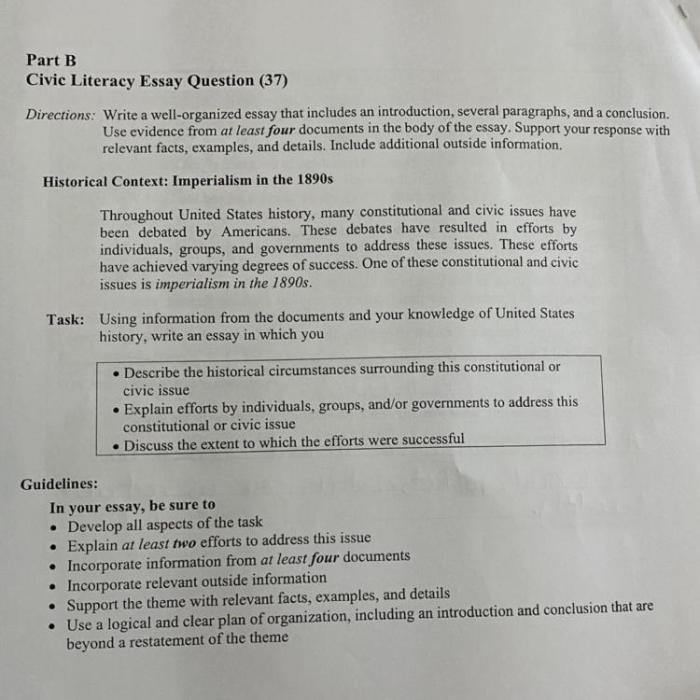
The introduction serves as the gateway to your essay, capturing the reader’s attention and laying the groundwork for your argument. It should be concise, engaging, and effectively introduce the topic and your thesis statement.
Creating a Compelling Hook
Begin with a compelling hook that draws the reader in. This could be a surprising statistic, a thought-provoking question, or a vivid anecdote that relates to your topic. The hook should be relevant to your thesis and pique the reader’s curiosity.
Crafting a Strong Thesis Statement
The thesis statement is the backbone of your essay. It clearly and succinctly states your main argument or claim. It should be specific, arguable, and supported by evidence. Avoid vague or overly broad thesis statements that do not provide a clear direction for your essay.
Providing Background and Context
Provide necessary background information and context to establish a foundation for your essay. This may include historical events, relevant research, or definitions of key terms. The background information should be concise and directly related to your thesis statement.
Developing the Body Paragraphs
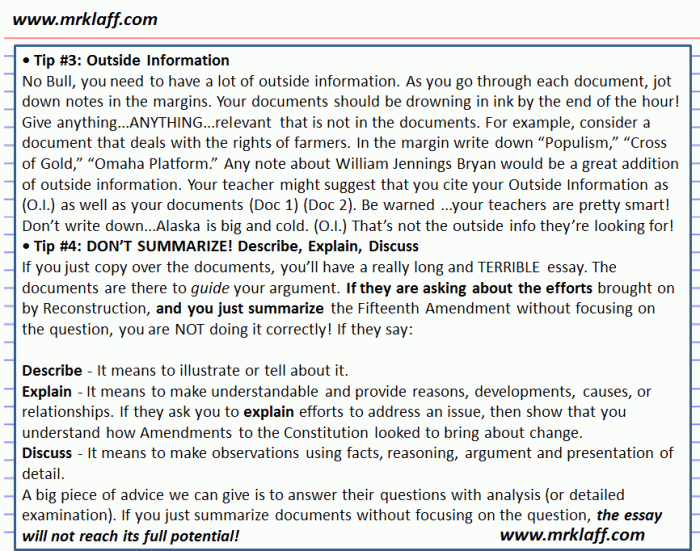
The body paragraphs of a civic literacy essay provide evidence and analysis to support the thesis statement. Each paragraph should focus on a single that relates to the thesis and provide evidence from research to support the claims and arguments presented.
Using Evidence from Research
Evidence from research can include statistics, data, quotes from experts, and examples from history or current events. When using evidence, it is important to cite the source correctly and to analyze and interpret the evidence effectively.
Analyzing and Interpreting Evidence
To analyze and interpret evidence, consider the following questions:
- What is the main point of the evidence?
- How does the evidence support the claim being made?
- Are there any limitations or biases in the evidence?
- How can the evidence be used to support the thesis statement?
Writing the Conclusion: How To Write A Civic Literacy Essay
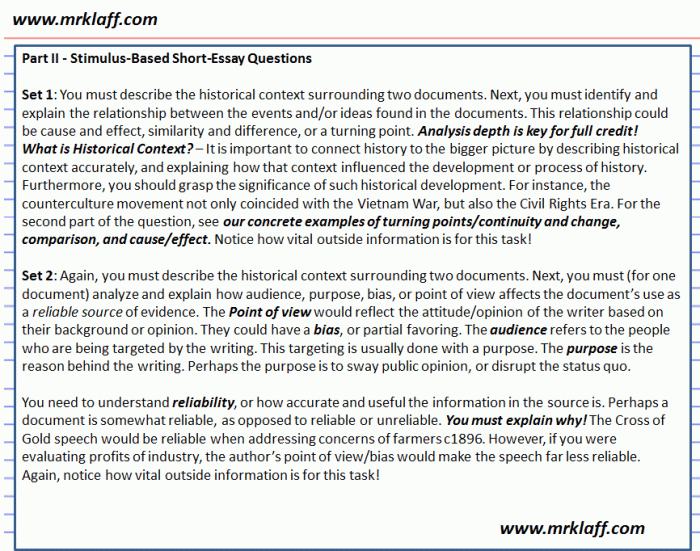
The conclusion of a civic literacy essay serves as a crucial component in summarizing the main points, reinforcing the thesis statement, and leaving a lasting impression on the reader. It is an opportunity to reiterate the key arguments presented throughout the essay and offer a final reflection or call to action.
Restating the Thesis Statement
The conclusion should begin by restating the thesis statement in a concise and engaging manner. This restated thesis statement should reflect the main argument of the essay and serve as a reminder of the key points discussed.
Summarizing the Main Points
After restating the thesis, the conclusion should briefly summarize the main points of the essay. This can be done by highlighting the key arguments and evidence presented in each body paragraph. By doing so, the reader is reminded of the logical flow of the essay and how each point contributed to the overall argument.
Final Reflection or Call to Action, How to write a civic literacy essay
In addition to summarizing the main points, the conclusion can also provide a final reflection on the topic or issue discussed in the essay. This reflection can offer insights or perspectives that were not covered in the body paragraphs and can help to deepen the reader’s understanding of the topic.
Alternatively, the conclusion can end with a call to action. This call to action can encourage the reader to take a specific action or engage in further discussion on the topic. By doing so, the essay can have a lasting impact beyond the classroom and contribute to civic discourse.
Tips for an Effective Conclusion
- Keep the conclusion concise and focused.
- Restate the thesis statement in a fresh and engaging way.
- Summarize the main points without repeating the body paragraphs verbatim.
- Offer a final reflection or call to action that is relevant to the topic.
- Proofread the conclusion carefully to ensure it is clear, coherent, and grammatically correct.
Key Questions Answered
What is the key to writing a strong civic literacy essay?
A strong civic literacy essay is built upon a solid understanding of the topic, supported by credible evidence and a well-reasoned argument.
How can I develop a compelling thesis statement for my essay?
A compelling thesis statement should be specific, arguable, and supported by evidence. It should clearly state your main argument and provide a roadmap for the rest of your essay.
What are some effective strategies for organizing my essay?
Effective essay organization involves creating an Artikel that maps out the flow of your argument. Use topic sentences to introduce each body paragraph and ensure smooth transitions between paragraphs.
